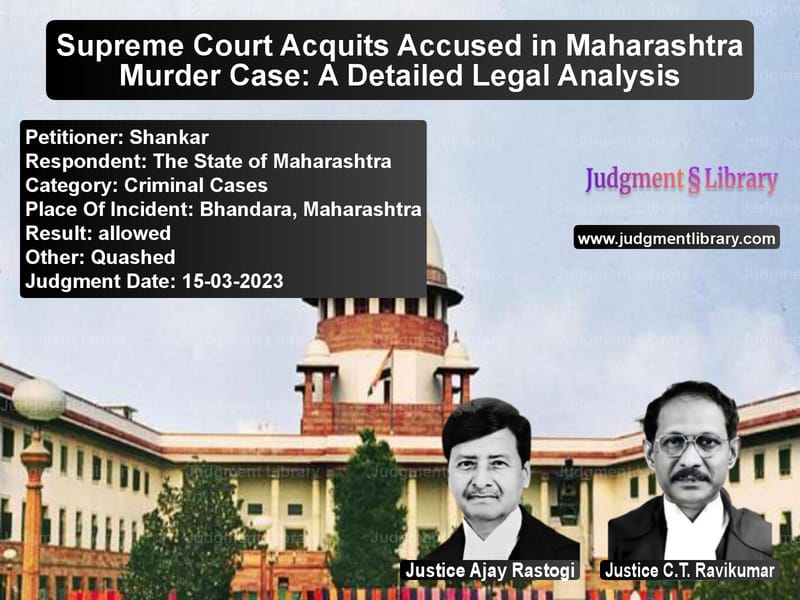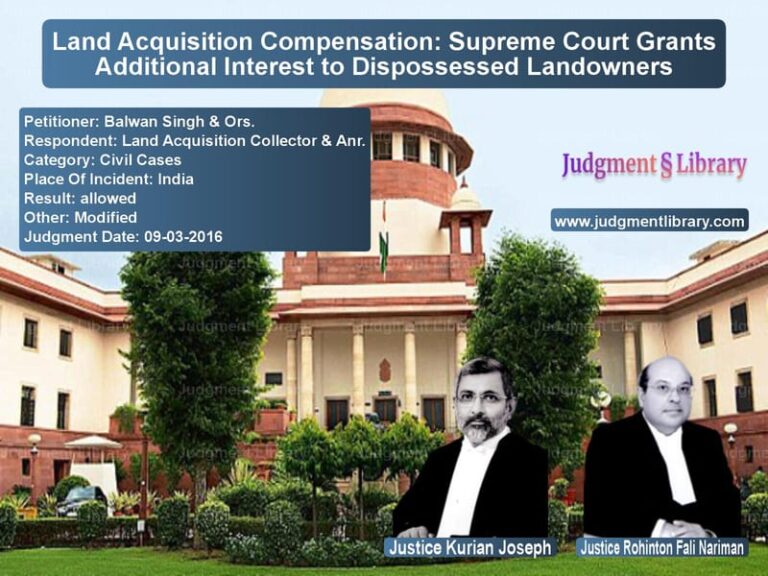Supreme Court Acquits Accused in Maharashtra Murder Case: A Detailed Legal Analysis
The case of Shankar vs. The State of Maharashtra highlights the importance of proving guilt beyond a reasonable doubt in cases based on circumstantial evidence. This case, which involved an appeal against a conviction for murder under Sections 302 and 34 of the Indian Penal Code (IPC), was decided by the Supreme Court on March 15, 2023. The Supreme Court overturned the conviction, citing insufficient evidence and gaps in the prosecution’s case.
Background of the Case
The case originated from an incident that took place on December 12, 2001, in Bhandara, Maharashtra. The victim, Rahul Pundlik Meshram, was last seen with the accused individuals, including Shankar and others. Later that evening, his body was discovered with 22 ante-mortem injuries, suggesting a brutal attack with sharp weapons.
The prosecution alleged that the accused had taken the victim on motorcycles under the pretense of consuming alcohol and subsequently murdered him. The case was entirely based on circumstantial evidence, with no direct witnesses to the crime.
Trial Court Proceedings
The Additional Sessions Judge, Bhandara, found the accused guilty under Section 302 read with Section 34 IPC, sentencing them to life imprisonment. The trial court based its decision on the following key circumstantial evidence:
- The victim was last seen with the accused at the house of Chintaman Gatey (PW-8).
- The accused and the victim left together on motorcycles.
- The victim’s body was found shortly after he left with the accused.
- The discovery of a blood-stained weapon and burned clothes, allegedly belonging to the accused.
On appeal, the Bombay High Court confirmed the conviction, agreeing with the trial court’s findings.
Appeal to the Supreme Court
The accused challenged their conviction before the Supreme Court, arguing that the prosecution had failed to establish a complete chain of circumstantial evidence. Their primary contentions were:
- There were inconsistencies in the prosecution witnesses’ testimonies.
- The ‘last seen’ evidence was not conclusively established.
- The prosecution failed to establish motive.
- The alleged recovery of weapons and clothes lacked independent corroboration.
Supreme Court’s Analysis
The Supreme Court critically examined the evidence and noted several flaws in the prosecution’s case.
1. Lack of Direct Evidence
The Court observed that there was no direct evidence linking the accused to the crime. The entire case rested on circumstantial evidence, which needed to establish a clear and conclusive chain leading to the guilt of the accused.
2. Doubts Regarding ‘Last Seen’ Theory
The prosecution’s case relied heavily on the ‘last seen’ theory, arguing that the victim was last seen with the accused at the house of Chintaman Gatey (PW-8). However, the Supreme Court found inconsistencies in the testimonies of key witnesses:
- PW-8 claimed that the accused and the victim were present at his house, but his testimony had contradictions.
- PW-10, another prosecution witness, did not confirm the victim’s presence at the house.
- The Court noted that inconsistencies in witness testimonies created reasonable doubt regarding the ‘last seen’ theory.
3. Failure to Establish Motive
The prosecution alleged that the motive for the murder was a prior altercation between the victim and the brother of one of the accused. However, the Supreme Court found that the prosecution had failed to substantiate this claim. It noted:
“Failure to establish motive in a case based on circumstantial evidence weakens the prosecution’s case significantly.”
Given that motive is often crucial in circumstantial evidence cases, this gap further weakened the case against the accused.
4. Issues with Recovery of Evidence
The prosecution relied on the alleged recovery of a weapon and burned clothes belonging to the accused. However, the Supreme Court found that:
- The recovery of the weapon was not properly corroborated by independent witnesses.
- The bloodstains found on the weapon and clothes were not conclusively linked to the victim.
5. Legal Precedents on Circumstantial Evidence
The Supreme Court referred to several key judgments that outline the requirements for proving a case based on circumstantial evidence:
- In Sharad Birdhichand Sarda vs. State of Maharashtra, the Court established that circumstantial evidence must form a complete chain excluding all other possibilities.
- In Prakash vs. State of Rajasthan, the Court held that motive, last seen evidence, and recovery of incriminating articles must be clearly established for conviction.
The Court found that these principles were not met in the present case.
Final Judgment
The Supreme Court concluded that the prosecution had failed to establish the guilt of the accused beyond a reasonable doubt. The Court observed:
“In a case based on circumstantial evidence, suspicion cannot replace legal proof. The prosecution must establish an unbroken chain of events leading to the guilt of the accused.”
Accordingly, the Court set aside the convictions and acquitted the accused, granting them the benefit of the doubt.
Conclusion
The Supreme Court’s decision in this case underscores the fundamental principle that an accused person is presumed innocent until proven guilty beyond a reasonable doubt. It also reinforces the importance of a well-established chain of circumstantial evidence in cases where direct evidence is unavailable.
This judgment serves as a reminder to law enforcement and the judiciary to ensure that convictions are based on solid and credible evidence, safeguarding the rights of the accused while delivering justice.
Petitioner Name: Shankar.Respondent Name: The State of Maharashtra.Judgment By: Justice Ajay Rastogi, Justice C.T. Ravikumar.Place Of Incident: Bhandara, Maharashtra.Judgment Date: 15-03-2023.
Don’t miss out on the full details! Download the complete judgment in PDF format below and gain valuable insights instantly!
Download Judgment: shankar-vs-the-state-of-maharas-supreme-court-of-india-judgment-dated-15-03-2023.pdf
Directly Download Judgment: Directly download this Judgment
See all petitions in Murder Cases
See all petitions in Bail and Anticipatory Bail
See all petitions in Attempt to Murder Cases
See all petitions in Fraud and Forgery
See all petitions in Theft and Robbery Cases
See all petitions in Judgment by Ajay Rastogi
See all petitions in Judgment by C.T. Ravikumar
See all petitions in allowed
See all petitions in Quashed
See all petitions in supreme court of India judgments March 2023
See all petitions in 2023 judgments
See all posts in Criminal Cases Category
See all allowed petitions in Criminal Cases Category
See all Dismissed petitions in Criminal Cases Category
See all partially allowed petitions in Criminal Cases Category







